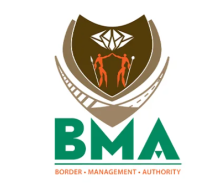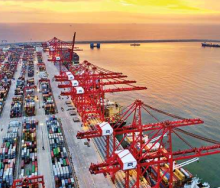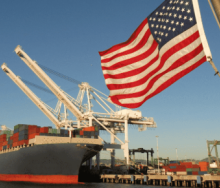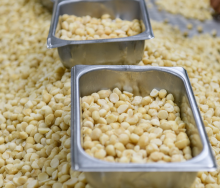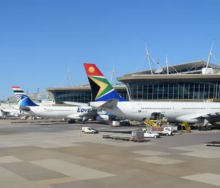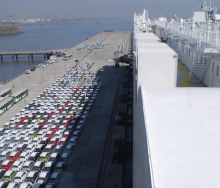Straddle carrier capacity and breakdowns continue to hold back container throughput at the Port of Durban, but Transnet Port Terminals (TPT) believes the current situation of underperformance can be rectified through better mechanical management of equipment.
On Monday, TPT chief executive, Jabu Mdaki, said the port was closing in on minimising avoidable wear and tear on straddles by deploying haulers to cover most of the up-and-down berth movement.
He said the strategy was already under way through 44 haulers received by Transnet recently, 22 of which were deployed to Pier 1 at Durban Container Terminal (DCT) and the balance to Pier 2, while six waited to be commissioned.
Mdaki said the current distribution of equipment was based on a “hybrid model”, entailing “equal reliance on both straddles and haulers”.
“Instead of using straddle carriers to cover long distances along the quay, you keep them next to the containers in the stacking area while your haulers do most of the movement (to and from vessels).”
Earle Peters, managing executive for Durban Terminals at TPT, said the idea was to minimise mechanical wear and tear on straddles by refocusing on their use for container stack arrangement.
A private-sector source in Durban alluded to this as a “possible stack reconfiguration” that might alleviate current throughput challenges hampering harbour carriers from clearing enough containers fast enough on the land-side.
Peters said considering alternative ways to help transporters collect and deliver containers at DCT, such as the current straddle-hauler distribution system, had been in operation since 2022 already.
Reconfiguring stack arrangements, he said, “is not a case of us considering it”.
“We’re already doing it. We have implemented a model that we believe, in time, will have the desired effect. It includes talking to OEMs (original equipment manufacturers) to acquire institutional knowledge so that we can better deal with equipment breakdowns.”
He said it was hoped that through progressive means of better managing equipment, TPT could accelerate the repair process of equipment going out of action.
For now, though, TPT still has a straddle-sized headache, one that often leads to slowed container movement, which also impacts harbour carriers.
Peters said: “Our focus is on getting parts to repair these machines. It places significant dependence on OEMs and we’re trying to address delays between us and our suppliers.”
He said 20 new straddle carriers had been ordered and the delivery of the first four was expected in December. Thereafter, delivery of the remaining 16 straddles would be done two at a time over a period of eight months.
But harbour carriers, in particular, are getting impatient with the state-owned logistics company about several issues they say are holding back the speed and efficiency of trade at the port – agonisingly slow container movement, an automated truck-slot booking system that has been slated as ineffective and open to exploitation, and the perceived lack of TPT to come clean about what it’s doing to create long-term solutions for long-standing problems.
Last week, a harbour carrier outfit called Africa Trans Carriers, announced that it would be closing its doors and retrenching 28 people after 17 years of business, because it barely made R2 500 a day due to the truck backlog at DCT.
Peters denied that the booking system had anything to do with the current situation, citing its use by 66 container terminals across the world.
He said it was also untrue that TPT was not meeting with industry over issues affecting trade.
“We have weekly meetings with at least four associations from the private sector to discuss matters of concern.”
He added that there was improvement at the port regarding container movement, “but we realise that we’re not yet out of the woods.
“There are many operators within industry that work with us, and we’re grateful that they are helping us help them.”
Mdaki said the inclement conditions that the port had had to deal with was really taking a heavy toll on the port, and that everything in TPT’s power was being done to mitigate against climate and related equipment breakdowns.
In the latest Cargo Movement Update by the South African Association of Freight Forwarders and Business Unity SA, ongoing weather impacts and equipment breakdown are yet again flagged, as they have been almost week-on-week, as affecting container throughput at the port.


